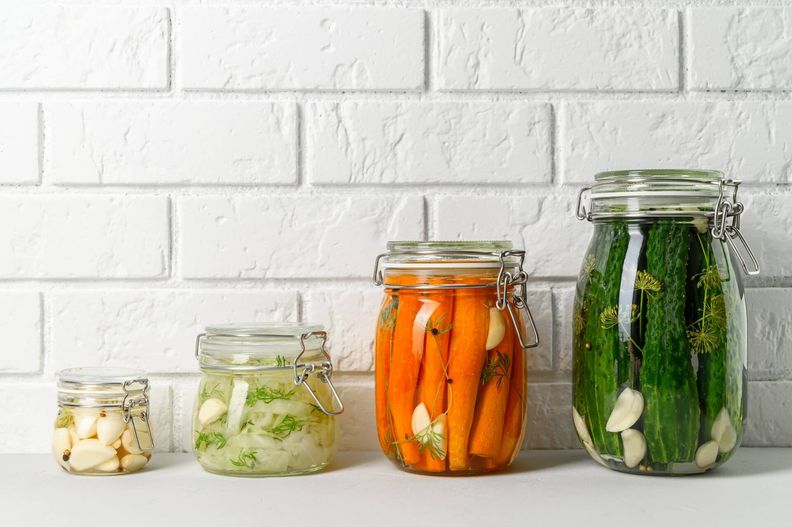Making your own fermented foods allows you to tackle food waste by making the most of vegetables, fruit and other foods that may otherwise end up in the bin.
3 fermented recipes to fight food waste
Making your own fermented foods allows you to tackle food waste by making the most of vegetables, fruit and other foods that may otherwise end up in the bin.
3 fermented recipes to fight food waste


Fermented food is certainly trendy but to us, there's much more to it than that. Making your own pickled foods allows you to tackle food waste by making the most of vegetables, fruit and other foods that may otherwise end up in the bin. Another huge plus of fermented food is that it has probiotic benefits to help to balance your gut’s microbiome of bacteria to aid digestion.
What's the difference between a pickle and a ferment? All ferments are pickles, but not all pickles are ferment. By pickling with acid, you don't get the same benefits as naturally fermented food.
Fermenting food gives it a deliciously tart tanginess, so if you like flavours that make your mouth water, fermenting is for you.
EASY FERMENTED FOOD RECIPES
FERMENTED GARLIC
You need: garlic, sea salt, water, a jar

It’s best that you start simple when it comes to home fermentation. Fermented garlic is easy and incredibly handy… Rather than letting those cloves go brown, you can jar it up in brine and use it in literally anything.
Start by sterilising the jar you’ll store your garlic in. Add your garlic, 3g of sea salt and 100ml of water. Ensure your cloves are totally submerged. Now, it’s time to be patient - store it at room temperature and ‘burp’ your jar daily for the first few days by gently opening to release gas and then closing it up tight again.
If you’re happy with how your fermented garlic tastes after 2 weeks, pop it in the fridge and enjoy!
SPICY FERMENTED CARROTS
You need: carrots, jalapeños, water, sea salt, a jar

Vegetables are one of the most wasted foods out there so fermenting your carrots will save them from the back-shelf graveyard. Fermented carrots are delicious in salads or as a snack with hummus.
Again, start by sterilising your jar. Place two jalapeños, chopped lengthways, in your jar. Pack carrot sticks or thick slices into your jar, leaving about 3cm from the jar top. To make your brine, follow a ratio of 1 tablespoon of salt to 500ml of water. Cover your carrots in the water. Store it at room temperature out of direct sunlight for 7 - 10 days and then move to the fridge.
KEFIR
You need: milk, wooden/plastic spoon and bowl, kefir grains, a jar, water, coffee filters, rubber band, plastic colander, jug

Making your own kefir, a cultured milk drink, is easier than you think and a great way to get probiotics into you. All you need is cow’s milk, coffee filters and kefir grains which you can get from specialty grocers, health food stores and online.
When you’re making kefir, you want to avoid metal utensils. Unsurprisingly, start by sterilising your jar and any tools you’re using. Add about a tablespoon of kefir grains to a litre jug of cow milk. Affix your coffee filters to the top of the jug with a rubber band to stop anything from getting in. Let it sit somewhere warm and dark for a day. Kefir is thicker than milk and should have a fermented smell to it. Strain your kefir through a plastic colander, stirring with a wooden spoon to push it through. From here, you can remove your kefir grains, rinse out your jug, re-add your kefir grains and do it all again! To store your kefir, place it in a sealed container and pop it in the fridge, using it up to two weeks after you made it.
The benefits of fermented foods
- Fermented foods have antioxidant and anti inflammatory benefits and can affect the gut microbiome, both short and long term. (1)
- By fermenting vegetables, you can magically make them into a source of vitamin B12 - handy for vegetarians and vegans. (2)
- In a study by Stanford School of Medicine, four types of immune cells showed less activation in the group who had eaten fermented foods. What this could mean would be reduced inflammation in the body! (3)
FURTHER READING ABOUT FOOD WASTE
Should you keep fruit and veg in the fridge?
SOURCES
- Leeuwendaal NK, Stanton C, O'Toole PW, Beresford TP. Fermented Foods, Health and the Gut Microbiome. Nutrients. 2022 Apr 6;14(7):1527. doi: 10.3390/nu14071527. PMID: 35406140; PMCID: PMC9003261.
- Harvard Health Publishing. Fermented Foods Can Add Depth To Your Diet. 2021.
- Stanford Medicine News Center. Fermented-food diet increases microbiome diversity, decreases inflammatory proteins, study finds. 2021.
start saving food today
start saving food today
Our app is the world's largest marketplace for surplus food. We help users rescue good food from going to waste, offering great value for money at local stores, cafes and restaurants.
JOIN 180,000 BUSINESSES FIGHTING FOOD WASTE WITH US
JOIN 180,000 BUSINESSES FIGHTING FOOD WASTE WITH US



